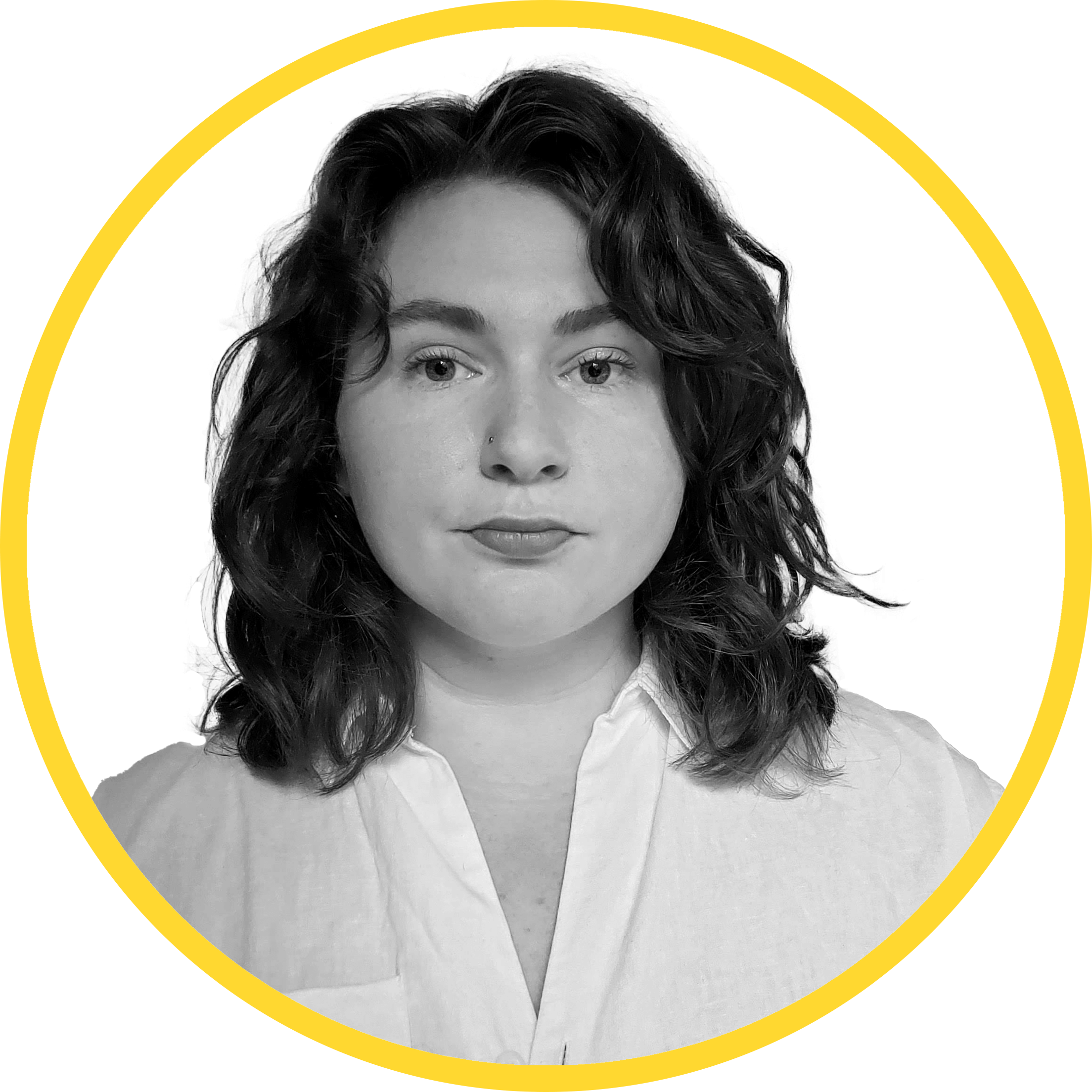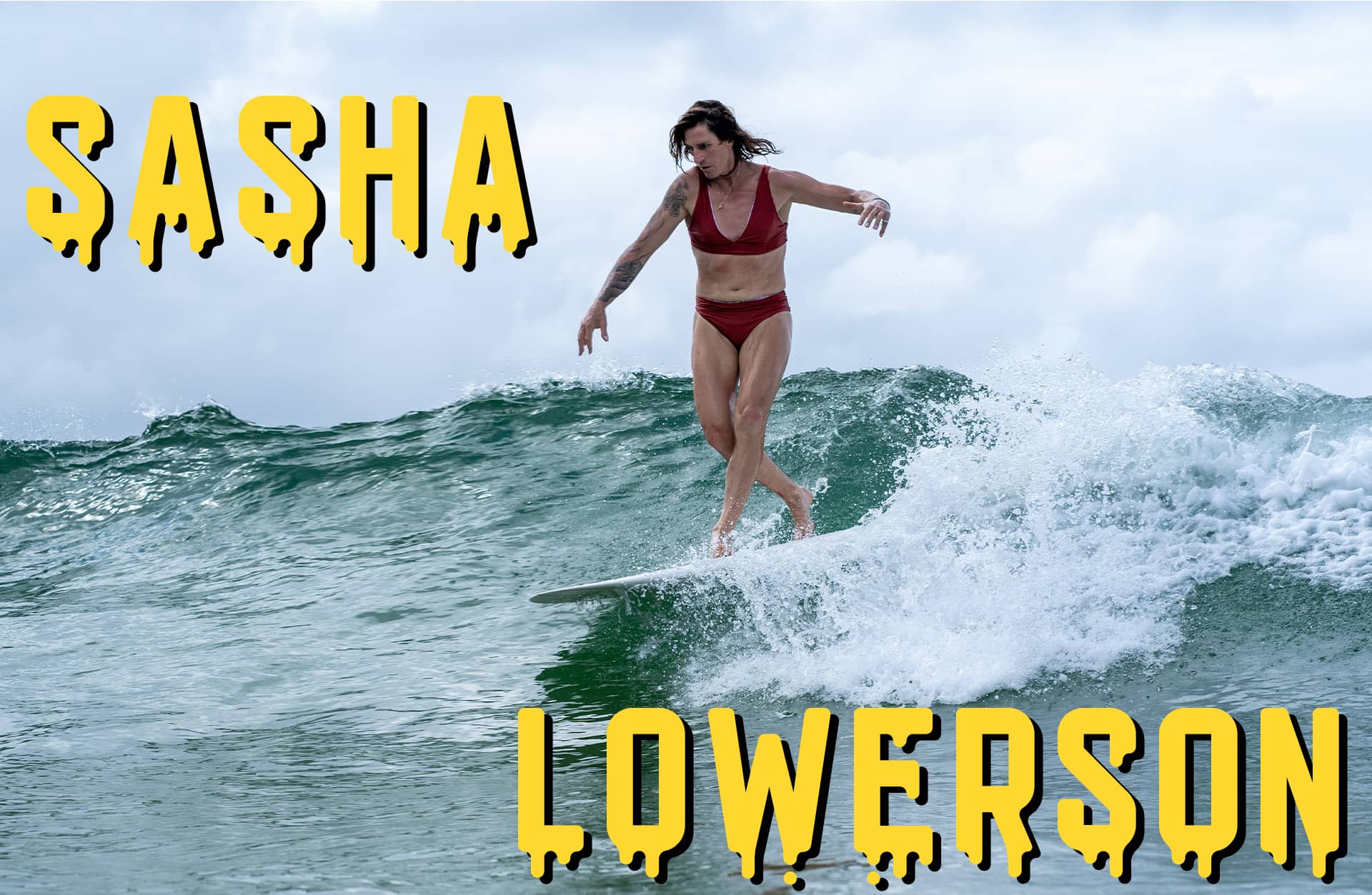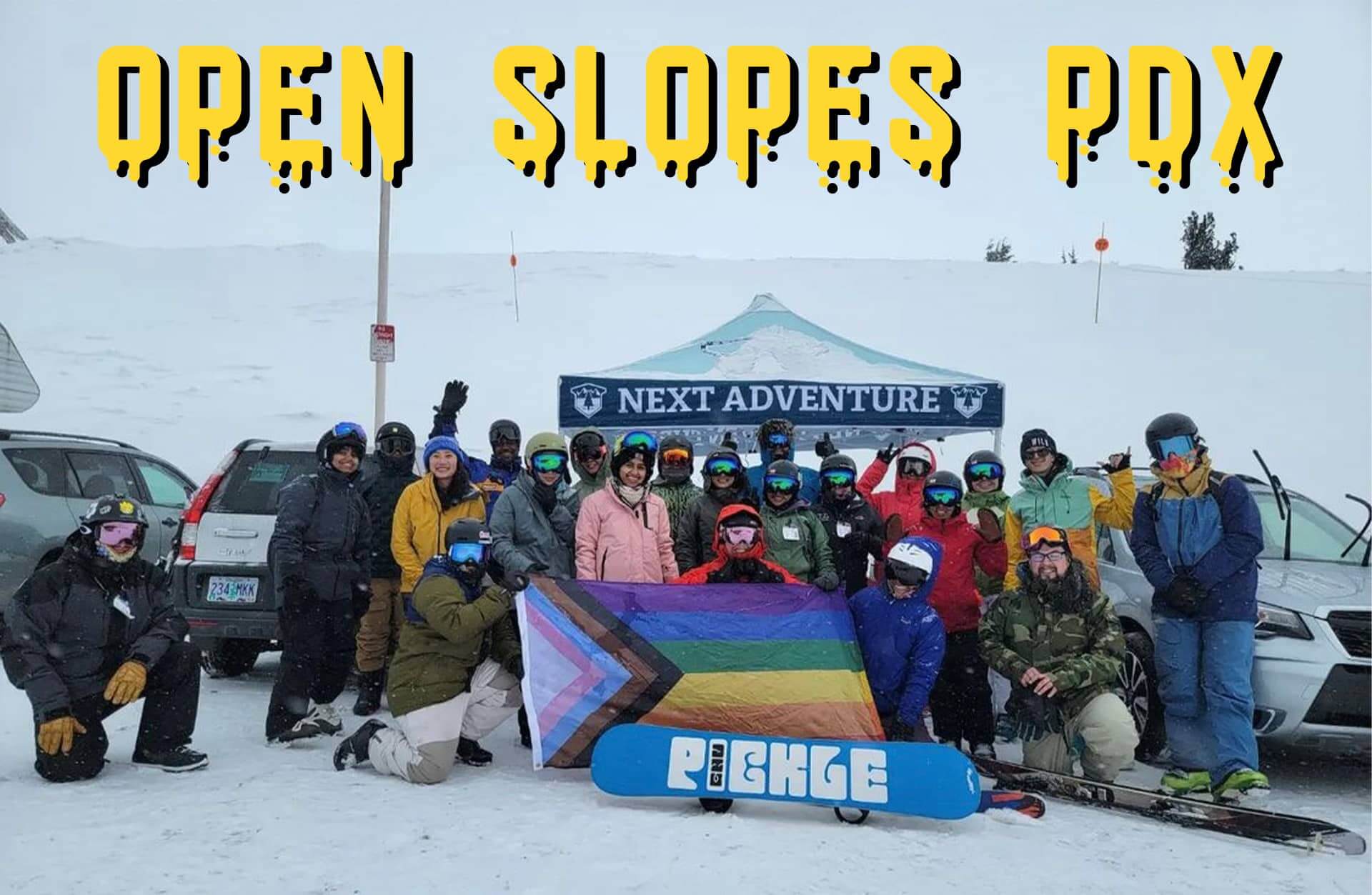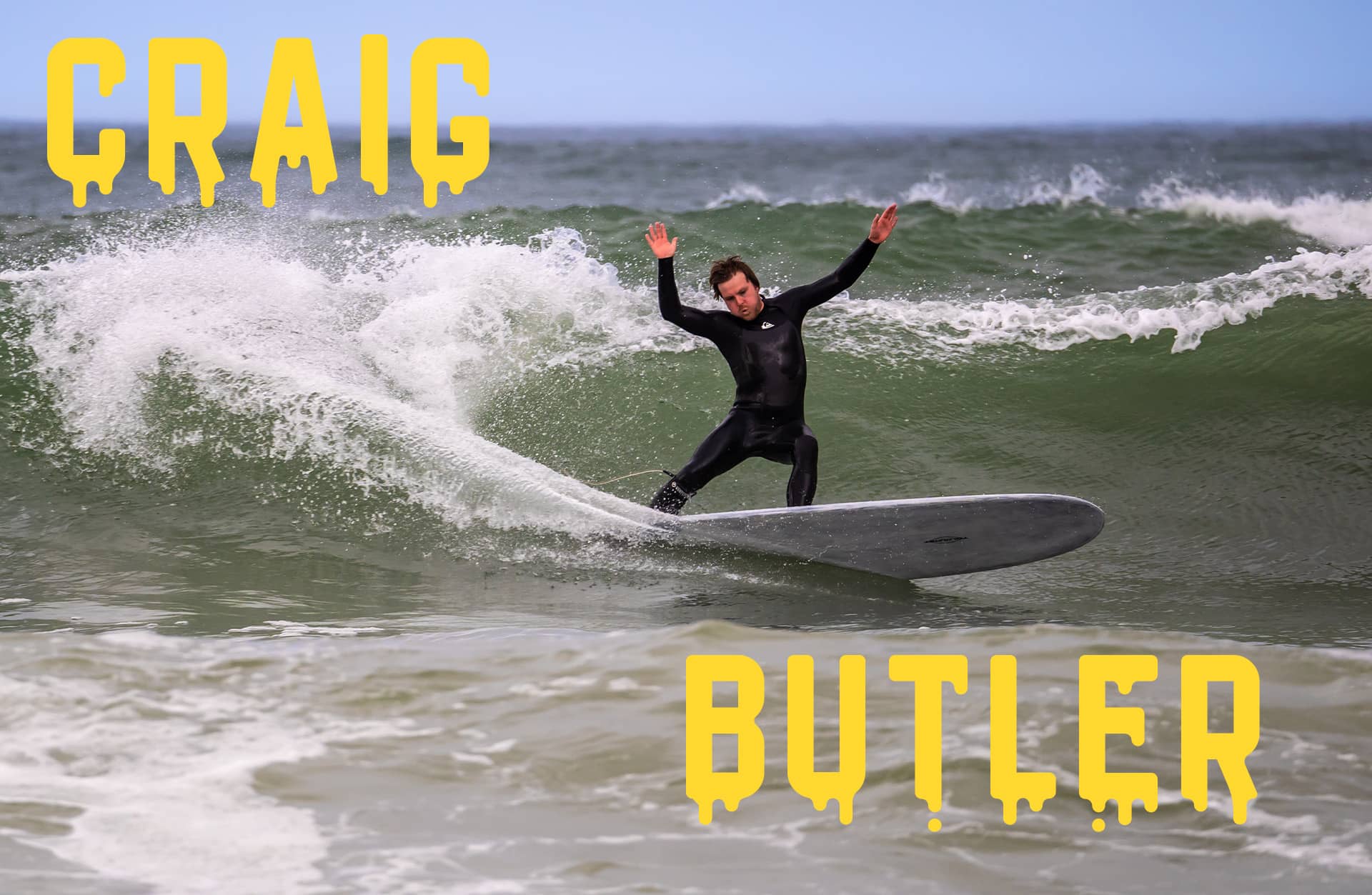SURF // 01 DEC 2022
FEEL GOOD SURF CLUB
“It was an instant thing,” smiled Nina Heynderickx, recalling the moment she fell in love with surfing. The founder of Feel Good Surf Club, an inclusive community for queer and BIPOC surfers, Heynderickx became obsessed with surfing her first time out in the water in Fall of 2019. “I think it was because very few times in life, as an adult, do we have the opportunity to try and succeed at something really quickly or just discover something new that you’re really into. I think so much of our life becomes repetitive. You have your job, your friends, whatever hobbies you have, and it can be really difficult to go out and do something new. There’s something about going out into this very large body of water and working with Mother Nature to ride this wave. As I’m talking about it, it seems a lot more metaphysical and spiritual than maybe I realized at a surface level, but there was just something about it that checks all of the boxes for me.”
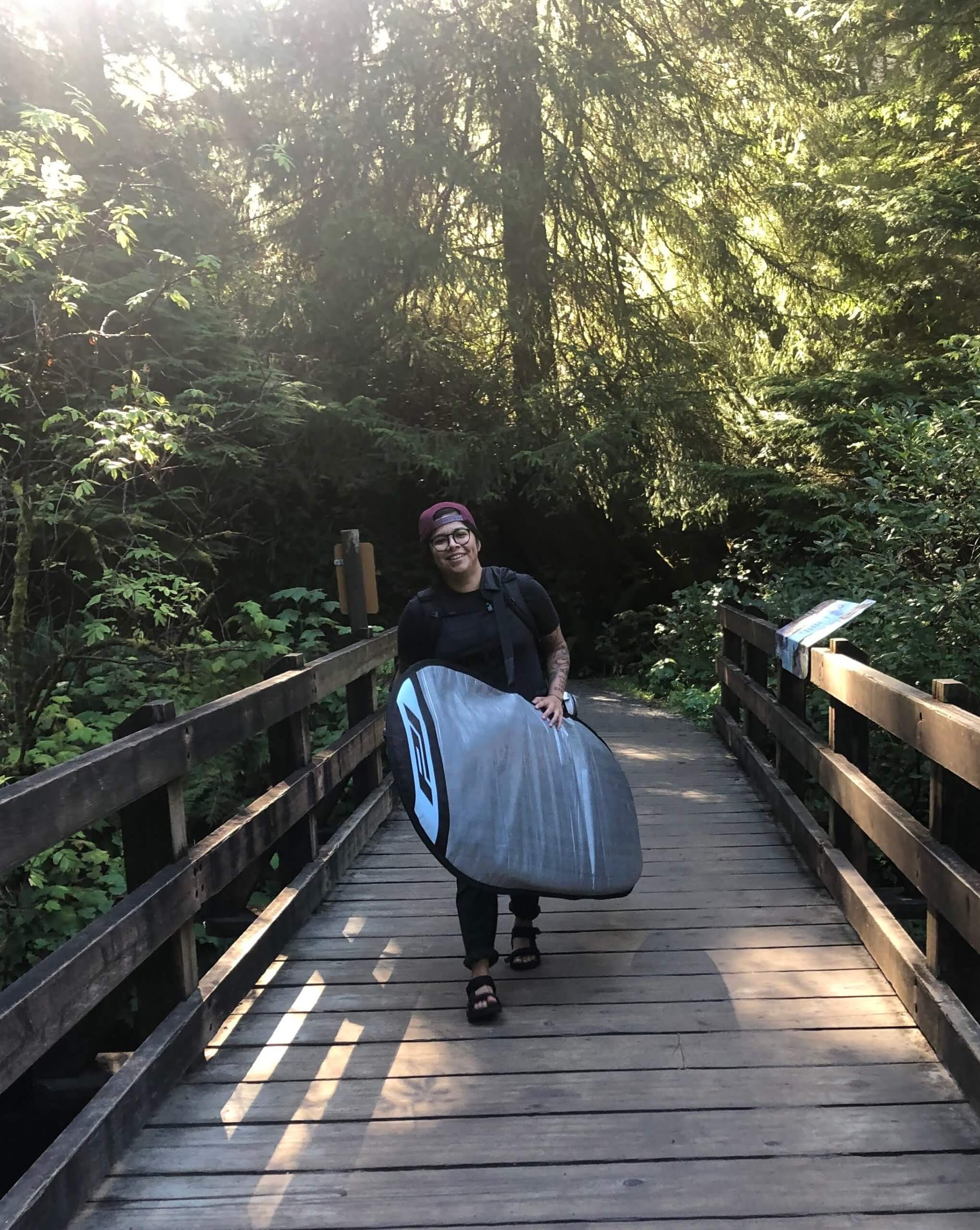
Growing up in the Central Valley of California, Heynderickx wasn’t exactly a beach kid. She spent her time after school playing in competitive soccer leagues, and in the off season she was out playing softball. When she did make the trip to the coast, it was to Los Angeles to visit with family. Still, even with the closest waves a two hour drive away, she dreamed of someday learning to surf. “Surfing was always one of those things that I had in the back of my mind, where, if a fairy god person came down and was like, ‘if you could be good at one sport, what would it be?’ It was always surfing for me,” explained Heynderickx. “Even though I’m not a strong swimmer, terrified of sharks, and pretty terrified of the ocean.”
When she relocated to Portland, Oregon ten years ago, surfing was the furthest thing from Heynderickx’s mind. It wasn’t until 2019, when Heynderickx’s partner mentioned that she wanted to try surfing, that the possibility percolated. “I was like, yeah, sure, we can go,” she laughed. “I’m going to sit on the beach and just drink a beer or read a book. I’m not going to get in the water.”
That remained her plan when she and her wife went out to the coast with Heyndrickx’s coworker, who was a regular surfer in the area. “When I went out there that first time, I had no intentions of surfing,” she reinstated. However, it seemed Heynderickx’s childhood wish still echoed in the background of her consciousness as she continued, “I did rent a wetsuit and a surfboard just in case I wanted to float around in the water. We went out to Short Sands and the magnitude of surfing got minimized for me. Because you see surfing on social media and on TV, and it’s always people getting barreled in big waves. [In reality] most surfing isn’t like that. Once I saw [what it really] was like, [I said,] okay, well, I’ll try it.”
“I stood up a few times my first time out and I was like, well, that was really cool. Then the competitive side of me kicked in, saying ‘I can do it better. I can do it faster.’ That’s how I got introduced to surfing. By chance and then because I was too competitive to not get in the water,” she laughed.
Waiting out the winter season, when the waves built beyond her comfort level, Heynderickx was scheming with her friends on how to get out to the beach more in the coming summer. “[One friend] has no real interest in surfing, but is like down to be the hype person on the beach,” she explained. “[Then my other friend] from South Carolina was super stoked on it. She was like, let’s go all the time. Very much a person similar to me, and that can really dig into a hobby and just get entrenched in it.”
Unfortunately, going into the Summer of 2020, beaches along the Oregon Coast were still closed due to the pandemic, so Heynderickx and her friends weren’t able to get out into the water until August. Though they were stuck on dry land, Heynderickx and her wife were stocking up on equipment that had suddenly become much more affordable. “Everything just dropped in price and so my wife and I were able to get these boards that we had been looking at. It was basically buy one, get one half off. We knew that we were going to keep going out there, and rather than spending $40 on rentals every time, [we thought] let’s just buy the boards.”
Kitted out with boards and wetsuits, Heynderickx and her friends were more than ready when the beaches finally opened up. Afforded the flexibility that came with her new remote work schedule, Heynderickx was able to make the most out of the short season.
Working at an ad agency that focused primarily on retail during a time when most retail stores shut their doors, Heynderickx was left with a lot of free time. Restless, she created Feel Good Surf Club. “I needed a creative outlet,” she explained. “ I was like, oh, what if I make a surf club and I make sweaters and stickers? It’s [just] the four of us and it’s funny because we’re not good at surfing and we’ll just wear this stuff on the coast.”
As the bars and restaurants re-opened their doors, Heynderickx began to meet other queer BIPOC folks through her friend groups. When surfing came up in conversation, many expressed their fascination with the sport and their subsequent hesitancy to get in the water. When faced with the potential of confronting crowds, figuring out what kind of board to get, what size and thickness of wetsuit was best, or even how to put a wetsuit on, they became overwhelmed, unsure where to even start.
“I just started to hear about [people’s hesitations] a lot more. I was like, well, I could probably turn this fun club that was just me hanging out with my friends into something that serves a purpose and actually gets more people out there,” said Heynderickx. “The core of what the club is founded around is really [wanting to provide] the experience that I had, because I had friends who were there to [help] me. All of the things that you trial by fire learn, I didn’t have to do that. I had a community that was built-in. It made it so easy. It made my experience getting into surfing really enjoyable. As I met more people that wanted to get into it and heard that a lot of their barriers for wanting to try were the same things that I was nervous about in the beginning. I was like, okay, there’s a space for this.”
After a winter of plotting, Heynderickx was ready when late spring 2021 rolled around. Putting out a couple of Instagram ads at the start of the season, Heynderickx shared her calendar of events for Feel Good Surf Club and ran a fundraiser to purchase some loaner boards for folks who came to meet ups. It caught on.
Even with the positive feedback, Heynderickx was shocked at the number of people that showed up to their first meetup in late May 2021. “I think the first meetup had 15 people, which was honestly exponentially more than I thought,” recalled Heynderickx. “I thought it was just going to be me, my two friends, [and maybe] one random person who thought that we were a legit club. But a lot of people came, and those people that came the first time are still people that come to many of our meetups now.”
“Everyone got along. Everyone was so nice,” she continued. “Everyone was on the same wavelength and had the same expectations of just wanting to go to the beach, not really wanting to try really hard. It was kind of perfect. It was so easy to talk to everybody and so easy to get along with everyone that I was like, okay, I didn’t make a mistake [in putting together this club].”
Before even daydreaming about Feel Good Surf Club, Heynderickx attended another women’s focused surf group in search of community. While it was fun to shred with other female surfers, Heynderickx felt that something was still missing. “Ultimately it wasn’t right for me because there is so much intersectionality with who I am, as a person of color [and as a queer person],” she explained. “You experience a certain level of discrimination or oppression or even just feelings of unsafe as a queer [BIPOC] person. One of them definitely is that otherness within Portland because it is predominantly White, and as soon as you leave the city center, [it becomes] exponentially more predominantly White.”
When placed in a situation that demands the vulnerability of attempting something new, feeling like an outsider can be an insurmountable mental block. This notion is especially emphasized in the surf world where testosterone and White privilege run riot. “I would say that 99% of the BIPOC people that I have talked to have at least three stories of something that just felt gross that happened to them,” explained Heynderickx. “Someone making a comment, or getting looked at for too long. The unfortunate thing, and I think what a lot of people don’t realize is that all of those little instances stick with you. You might go out and no one will say anything to you, but you just don’t feel comfortable because you’re always on edge. Waiting, expecting, trying to anticipate when that moment is going to happen. Because there’s that level of heightened awareness, it makes it really hard for you to enjoy the space that you’re in.”
In some worst case scenarios, Heynderickx has heard stories of hate speech in the water at some “locals only” spots. “You can stand your ground, but then do you want to risk any sort of physical violence?” explained Heynderickx. “There typically isn’t another BIPOC person out there to be your backup. That lack of security makes it really hard to enjoy what’s happening. That obviously translates in varying degrees to being a queer person out there. The queer community experiences types of oppression and types of violence that are unrelated to the color of their skin, but then can potentially be amplified by the color of their skin. You don’t get the benefits of the experience that you’re having, which with surfing and just being outdoors can be so restorative. If you’re so focused on your safety, which rightly so, you don’t get all of [those positive benefits and you start to ask yourself] is the risk worth the reward?”
By creating Feel Good Surf Club, Heynderickx wants to let other BIPOC queer folks know they’re not on their own in the water. Through the means of community, Feel Good Surf Club works to conquer these barriers of aloneness and otherness on the beach. Surrounding a beginning BIPOC queer surfer with others who, not only look like them and identify the same way, but are there to back them up, manifests a sense of security that allows that beginner to focus on the surf instead of fortifying against potential microaggressions.
Heynderickx also emphasized that the club welcomes absolute beginners. “People don’t believe me when I say this, but we are 100% for people who have never surfed before. As long as you know how to swim, you can come out and surf with us. I think when people hear ‘surf club’ they think that we’re going to be out there catching big waves and we’re going to leave them behind and they’re not going to know what to do. That’s not how we are at all. We are 100% geared towards that beginner surfer. 90% of the people that surf with us are still in whitewater. Just come see. Just come try it. You almost don’t believe it until you see it, but everyone that’s been out there always comes back. So, yeah, trust that we are for beginners.”
With more and more people attending meetups in 2021, Heynderickx knew she would need support for the 2022 season. Working a nine to five job during the week and spending the occasional weekend working as a motorcycle instructor, Heynderickx was struggling to find the time necessary to get to the beach. Her solution? Bring on co-leads.
“The co-leads that host the meetups, they are the ones that have actually been out there the most and meet people on the coast and facilitate that whole thing. Meeting new people and welcoming our recurring members,” explained Heynderickx. “The people that I’ve brought on have helped exponentially with being able to increase the amount of times that we’re out on the coast. I think within the first six weeks of this surf season, we were already out on the coast more than we were last summer, and my biggest key performance indicator is how many people come back.”
“It’s a really clear indicator that my co-leads are [perpetuating] the environment that I built last year. [One] that’s welcoming, that’s inviting, that’s fun, and people want to keep returning to. As you grow your community, you’re going to get more opinions. It’s easier to fail the bigger you get. [Given that] we’ve been able to maintain such a positive and enthusiastic feedback loop from the people who come, it feels like we’re still doing something right and it feels like we’re growing in the right way and scaling appropriately to how we want the club to continue to function.”
Along with providing more opportunities for coastal meetups, there’s been more work on the framework of the club. “[Another co-lead] works for nonprofits as a career, and she helps nonprofits find money and build infrastructure. So, she’s coming in and helping to put some structure to things, giving me enough information that I can start to make some decisions so that next year we’re set up to grow a little bit more exponentially. Bring in money from different revenue streams and then start to see what programming looks like at scale rather than being run out of my garage.”
Accessing the needs of the community, Heynderickx hopes to remove even more barriers to aspiring surfers in 2023. Right now, that means prioritizing the expansion of the club’s gear library. Using the money raised from a recent fundraiser, Heynderickx plans on purchasing more boards and adding some wetsuits for the club to lend out. This also means Heynderickx will be spending a portion of her winter figuring out a system to disinfect wetsuits at her home.
The other barrier Heynderickx hopes to tackle sometime in the future is the issue of transportation. “A lot of people don’t have cars in Portland, which I fully support, but it does make it difficult to get out to the coast and go surfing,” she explained. “So, I tossed around the idea of renting a van, one surf session a month where we can just cart out six to seven people in the van, so we’ll see what that looks like.”
Regardless of whatever list of actionables Heynderickx comes up with on her own, she plans on prioritizing resources requested by the community through end of the season surveys. As she explained, “I want to provide the existing community what it needs and not what I think it needs or what is the easiest to accommodate.”
This mindset is fundamental for Heynderickx in order to uphold the core values of Feel Good Surf Club. “I just keep remembering what my goal is and what the goal of the club is,” she said, explaining her approach to Feel Good’s future. “It’s not any sort of recognition or gratification for myself. It very much is to just create this space for queer and BIPOC people in Portland, and now the surrounding area, to have as much fun as I did that first time that I went out [surfing].”
In other words, the goal of Feel Good Surf Club is to make sure that everyone who participates feels good.
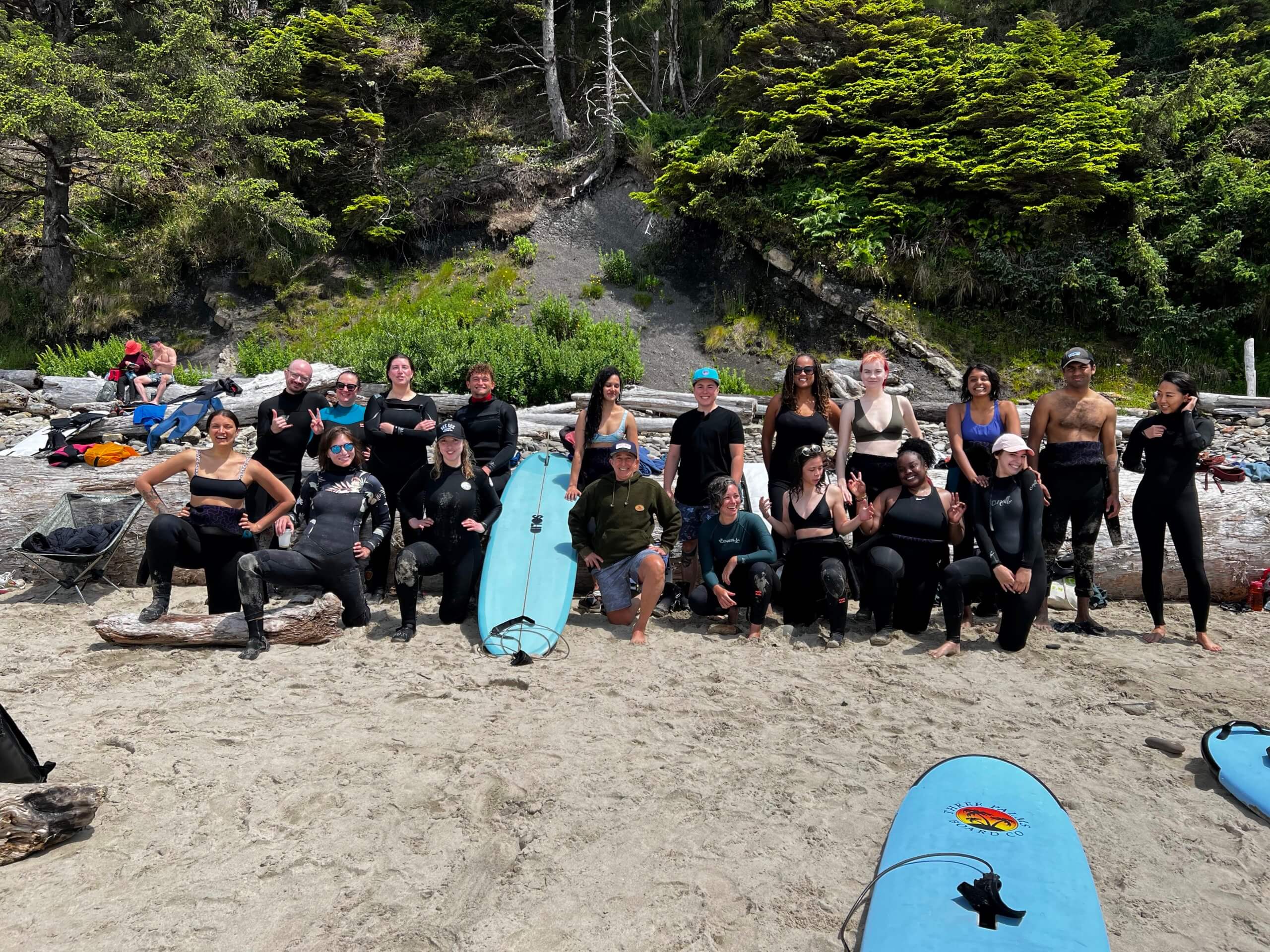
For Heynderickx one of the most rewarding parts of running Feel Good Surf Club has been watching the friendships that grow from their meetups. “[What] we’ve done really great at so far is creating a community that feels safe and feels inclusive,” she reflected. “After surfing last year, we went snowboarding. There was mushroom hunting, and it was because the people that came to surf with us said, ‘well, what are we doing during winter? Because we still want to hang out.’ What seemed like the hardest part to me, which was building the community that had the reputation and had the energy around it that people wanted to be a part of, has actually ended up being the easiest component of it.”
Cultivating and protecting this spirit of camaraderie usurps every other factor. As Heynderickx said, “We’ll find money, we’ll get gear. My wife will kill me because our house will never be free of sand for the rest of our lives. But, we’ll get people out there and they’ll have a good time. Surfing will hopefully start to look different.”

